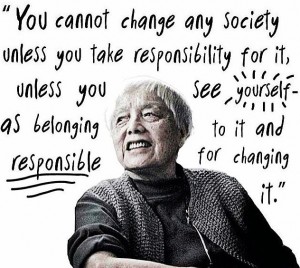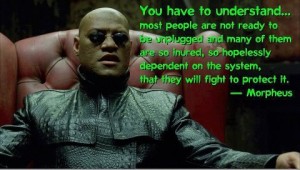![]()
Our comfort (and discomfort) comes from having, while seeking, deeper meaning. As professionals, we are asked to be experts; as individuals, we strive to be masters of our own domain. We are safe in the known and clarity of roles. What shelters you, both defines and confines you.
From our individual places of privilege, we cannot yet know what the collective answer will be. Whether you choose to stay inside or go out, you risk yourself, who you are now and who you wish to become or avoid becoming. We will find answers to questions we don’t yet know how to ask each other or ourselves.
Engagement means taking the time to wrestle with this tension; it is a necessary task toward equity.
These tensions between self and community identity, the known and unknown, encapsulate some fundamental things for me about working for equity in the government sector.
- You cannot change any society unless you take responsibility for it, unless you see yourself as belonging to it and responsible for changing it. – Grace Lee Boggs

It’s not us against them. It is all of us. We can’t hope to change anything unless we understand how we are connected to it and each other. Lots of people talk about seeing opportunities in challenges; you know, seeing the glass half full. When we are drinking from the glass, not filling it, do we see our power in creating both the problem and solution? Necessity may be the mother of invention, but from our place of privilege (of wants, not needs), what is our responsibility to actualize a solution? We have become experts in identifying gaps, especially in others, that it has overshadowed our ability to see ourselves as part of the problem and solution. We have to see how they are connected, fortify those relationships, and fulfill the responsibility that belonging creates. Grace Lee Boggs continues to inspire me to change the system from within myself; to lead by example; to be the change you want to see in the world.
- You have to understand … most people are not ready to be unplugged and many of them are so inured, so hopelessly dependent on the system, that they will fight to protect it. – Morpheus

Yes, sometimes you have to step outside of your life to understand it. Fiction, and sci-fi in particular, allows us to define and redefine the possibilities. What better way to understand the confines and complexity of reality than through the renegades that rebel against it. I know there is a reason why things work (or don’t) the way they do – if not a reason, then at least a historical path of choices and circumstances that have led us to where we are now. People’s lives depend on their ability to navigate this maze of choices, chances and circumstances; the more they understand the structure of this maze, the less incentive they have to change it (ie privilege). This is a friendly reminder to ask myself (when things do not sway my way, but also when it does): am I part of the problem, or part of the solution?
Am I using my privilege to dismantle injustice or not?
Answering this question needs to be an iterative learning process. Engagement (in all its forms: community, stakeholder, civic, employee, etc…) requires us to do one simple thing: get past our own inability to value what we don’t understand -yet. A paradigm shift comes with answers that are found together.
These words of wisdom have helped me through many a rough week of public service. I hope they spur your work as well. Feel free to share memes you love.
Sida Ly-Xiong is part of the GovLoop Featured Blogger program, where we feature blog posts by government voices from all across the country (and world!). To see more Featured Blogger posts, click here.





Such a great read! I love how you talk about engagement and how we need to get past what we do not understand yet. Can’t wait for your next post!
Thank you for sharing! I think those two quotes perfectly encapsulate the struggle and challenges we all face in understanding and improving our community.
I love that you’re are writing these blogs! Putting into perspectives about creating change, dismantling injustices and posing critical questions and reflections of a holistic self-development that doesn’t stop at the professional aspect of our lives but is deeply connected to our personal and external interactions.